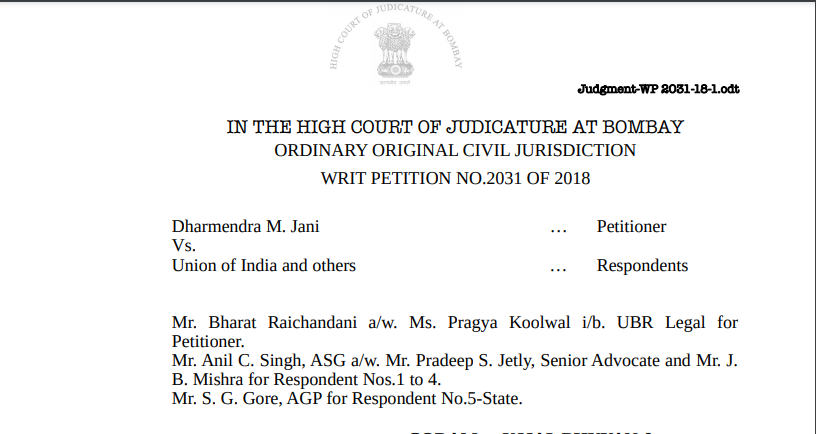Bombay HC in the case of Dharmendra M. Jani Versus Union of India
Table of Contents
Case Covered:
Dharmendra M. Jani
Versus
Union of India
Facts of the Case:
By filing this petition under Article 226 of the Constitution of India, the petitioner has prayed for a declaration that section 13(8)(b) and section 8(2) of the Integrated Goods and Services Tax Act, 2017 are ultra vires articles 14, 19, 245, 246, 246A, 269A and 286 of the Constitution of India and also ultra vires the provisions of the Central Goods and Services Tax Act, 2017, Integrated Goods and Services Tax Act, 2017 and Maharashtra Goods and Services Tax Act, 2017.
Related Topic:
Gujarat HC in the case of M/s Deepak Print Versus Union of India
Thus from the above, it is evident that the challenge made in this writ petition is to the constitutionality of section 13(8)(b) and section 8(2) of the Integrated Goods and Services Tax Act, 2017.
The case of the petitioner is that he is a proprietor of a proprietorship firm M/s. Dynatex International having its registered office at Andheri (West), Mumbai which is engaged in providing marketing and promotion services to customers located outside India. It is registered as a supplier under the provisions of the Central Goods and Services Tax Act, 2017 (briefly “the CGST Act” hereinafter).
Related Topic:
Tripura HC Order in the case of Shri Sentu Dey Versus The State of Tripura
Observations of the Hon’ble Court:
It is observed that Petitioner has placed much reliance upon the 139th Department related Parliamentary Standing Committee on Commerce in support of his contentions In support of his contention, Petitioner has extracted paragraphs 15.1 to 15.3 of the recommendations regarding the amendment to section 13(8) of the IGST Act to exclude ‘intermediary’ services and make it subject to the default section 13(2) so that the benefit of export of services would be available.”
Without commenting on the necessity for the Parliament, GST Council/Government to take steps to implement or effectuate the above recommendations, it is pertinent to appreciate that the recommendations, do not have any binding value nor are they enforceable.
Related Topic:
Supreme Court in the case of Gajendra Sharma Versus Union of India
Reliance upon reports of Parliamentary Committees are external aids to construction to be used only when there is ambiguity in the statute. The law relating to reliance upon Reports of Parliamentary Standing Committees has been once again reiterated in the decision of the Constitution Bench of the Supreme Court in the case of Kalpana Mehta v. Union of India 19. Paragraph 134 in the said judgment authored by the then Chief Justice of India Justice Dipak Misra and Justice A.M. Khanwilkar as well as paragraph 257 authored by Justice Dr. D. Y. Chandrachud are apt and are quoted as under:
Related Topic:
Madras HC Order in the case of Greenwood Owners Association Versus The Union of India
“134.…….it is clear as day that the Court can take the aid of the report of the parliamentary committee for the purpose of appreciating the historical background of the statutory provisions and it can also refer to committee report or the speech of the Minister on the foor of the House of the Parliament if there is any kind of ambiguity or incongruity in a provision of an enactment.
257……The validity of the advice which is tendered by a Parliamentary Committee in framing its recommendations for legislation cannot be subject to a challenge before a court of law. The advice tendered is after all that it purports to be: it is advisable to the legislating body. The correctness of or the expediency or justification for the advice is a matter to be considered by the legislature and by it alone.”
In any event, it is always open to Petitioner to make appropriate representation to give effect to the above recommendations and for the Respondents to consider the same.
Related Topic:
Bombay HC in the case of Daulat Samirmal Mehta Versus Union of India
The Decision of the Hon’ble Court:
In the circumstances, a position of law, as discussed, regarding the legitimacy of Section 13(8)(b) or Section 8(2) of the IGST Act cannot be doubted. Petitioner has neither made a case of the nonexistence of competence nor demonstrated any constitutional infirmity in Section 13(8)(b)or Section 8(2) of the IGST Act, nor a case of applicability of Section 8(2) of the IGST Act to the case of Petitioner. Petitioner has also failed to make out a case that Section 13 (8) (b) or Section 8(2) of the IGST Act are ultra vires the scheme of the IGST Act. Petitioner has failed to demonstrate that Section 13(8)(b) of the IGST Act is ultra vires Section 9 of the CGST Act or the MGST Act. Therefore the challenge fails.
Related Topic:
Supreme Court in the case of Union of India Versus M/s V.V.F Limited
In the light of the above, I am of the view that neither Section 13(8)(b) nor Section 8 (2) of the IGST Act are unconstitutional. Also, neither Section 13 (8) (b) nor Section 8 (2) of the IGST Act are ultra vires the IGST Act. Section 13 (8) (b) is also not ultra vires Section 9 of the CGST Act, 2017 or the MGST Act, 2017. Section 13(8)(b), as well as Section 8(2) of the IGST Act, are constitutionally valid and operative for all purposes.
Related Topic:
Supreme Court in the case of Madras Bar Association Versus Union of India
The petition is accordingly dismissed. There shall be no order as to costs.
Read & Download the full Copy in pdf:

 ConsultEase Administrator
ConsultEase Administrator
Consultant
Faridabad, India
As a Consultease Administrator, I'm responsible for the smooth administration of our portal. Reach out to me in case you need help.







